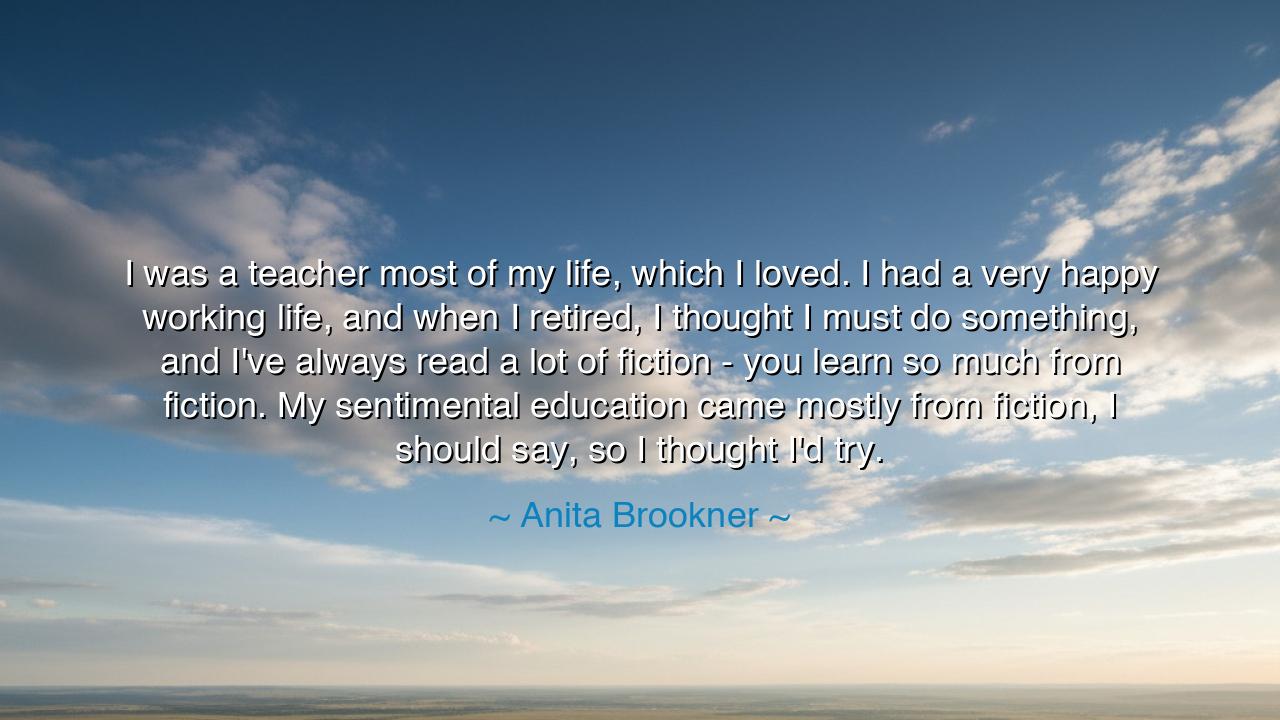
I was a teacher most of my life, which I loved. I had a very
I was a teacher most of my life, which I loved. I had a very happy working life, and when I retired, I thought I must do something, and I've always read a lot of fiction - you learn so much from fiction. My sentimental education came mostly from fiction, I should say, so I thought I'd try.






Hear the gentle yet profound words of Anita Brookner: “I was a teacher most of my life, which I loved. I had a very happy working life, and when I retired, I thought I must do something, and I've always read a lot of fiction—you learn so much from fiction. My sentimental education came mostly from fiction, I should say, so I thought I'd try.” Within this reflection is not only the tale of one woman’s journey, but the story of how life offers us seasons, each with its own work, each with its own gift, and how even in later years the soul may awaken to a new calling.
To say “I was a teacher most of my life, which I loved” is to declare a vocation well-lived. Teaching, the oldest and noblest of professions, shaped her life with joy and purpose. It was not a burden but a happy working life, filled with meaning. Yet Brookner reveals a truth that comes to all who retire: when one chapter ends, the soul still longs to create, to contribute, to be alive in new ways. She did not sink into idleness, but sought the next path her spirit might walk.
Here, fiction became her guide. Brookner tells us that she had “always read a lot of fiction,” and from this she had drawn her sentimental education—her deep understanding of human emotion, of the heart’s frailty, of longing, loss, and joy. Fiction, for her, was not mere pastime, but teacher. Just as philosophy teaches the mind, so fiction educates the soul. It shows us not only how people think, but how they feel, how they stumble, how they love. Through its pages, she had lived a thousand lives beyond her own, and now, in her later years, she felt called to add her own voice to this great chorus.
History shows us other souls who found their true voice late in life. Consider Laura Ingalls Wilder, who did not begin writing the Little House books until she was in her sixties. Her earlier life had been filled with labor and hardship, but when the time came, she transformed memory into story, and story into legacy. Or Miguel de Cervantes, who after years of struggle and misfortune, wrote Don Quixote in the autumn of his life, giving the world a masterpiece. Brookner stands in this lineage: those who prove that creation is not bound by youth, but belongs to every stage of existence.
The deeper meaning of her words is that life is not a single calling but a succession of them. One may begin as a teacher, and in that find joy and purpose. But when that season ends, another may begin—perhaps as a writer, or artist, or storyteller. To cling only to what was is to diminish what might yet be. Brookner shows us the courage to begin anew, to trust that the education gained from years of reading, observing, and feeling could blossom into creation.
The lesson for us is clear: never believe it is too late to begin. Whatever your age, whatever your past profession, the soul always has room to grow, to speak, to contribute. Read deeply, learn constantly, and when the time comes, dare to try. For as Brookner reminds us, fiction teaches, and from it one can even find the courage to create one’s own.
So I say to you: remember the wisdom of Anita Brookner. “My sentimental education came mostly from fiction, I should say, so I thought I’d try.” Let her words inspire you to live in seasons—working with joy in one, creating with courage in another. Do not despise the passage of time, for it may yet awaken gifts you did not know you had. Life does not end at retirement, nor at any age; it simply changes its shape, and the wise soul embraces each new form. Walk forward, then, into your own unwritten chapters, with courage to try and the faith that every season has its harvest.






AAdministratorAdministrator
Welcome, honored guests. Please leave a comment, we will respond soon